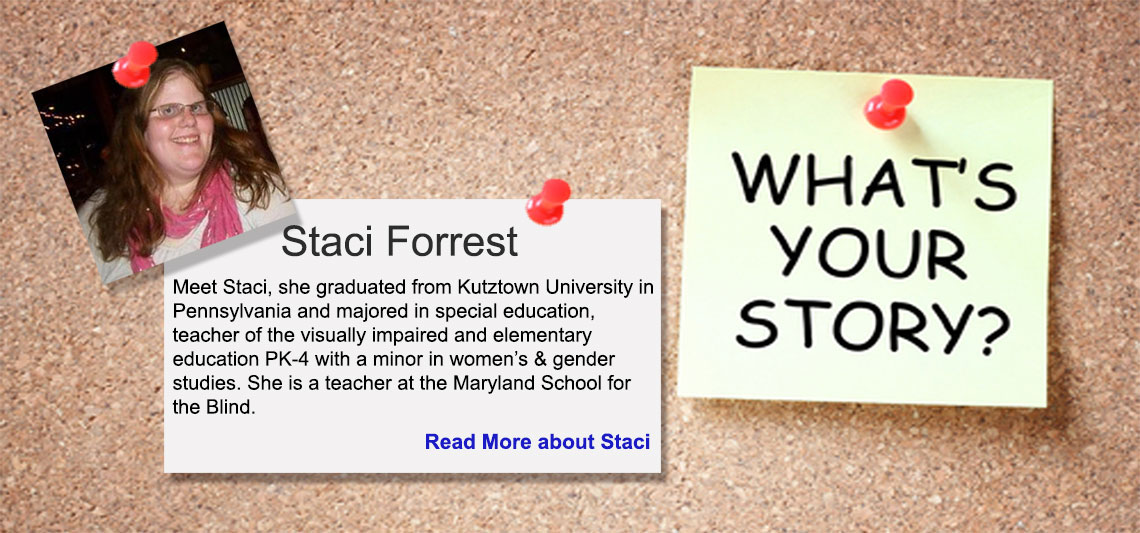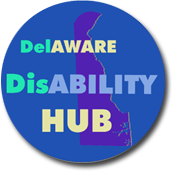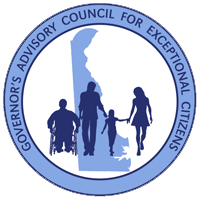Education is a significant part of a person's life. It is an enlightening process where revealed knowledge enables us to move forward and become resourceful. It allows us to advance into higher education, develop new interests and gives us a choice as to what we want to do in life. It may offer us the opportunity to work in a trade or start our own business. Whatever your choice, education is the key to societal growth.
Individuals with disabilities have milestones set for them and are guided with the help of their Individualized Education Program or Plan (IEP). You will also find information for the gifted and talented students who are often overlooked in classrooms or need additional stimulation to develop fully.

TOOLKIT
Information on assistive technology, IEP, advocacy, education, rights & regulations and more.

HIGHER EDUCATION
What to expect, how to prepare and find colleges and universities to attend.
FREQUENTLY ASKED QUESTIONS
As a parent, you may request that your child receive an educational evaluation to determine if she is eligible for special education services. A teacher or someone from the school or another public agency who has been working with your child may also mention that your child could benefit from special education services. The school, however, cannot conduct an educational evaluation until you, the parent, have given your permission by providing your informed written consent of the assessment.
What is the purpose of the IEP?An IEP sets reasonable goals for a child and states the services that the school will provide to the child.
When is the IEP developed?The IEP must be held within 30 calendar days after it is determined through a full and individual evaluation, that a child has one of the disabilities listed in IDEA and needs special education and related services. A child's IEP must also be reviewed at least annually after that to determine whether the annual goals are being achieved and must be revised as appropriate.
What is in the IEP?Each child's IEP must contain specific information, as listed within IDEA, our nation's special education law. Delaware Regulations can be found at Title 14 – Section 925 Subsection 20.0 Definition of Individualized Education Program. This includes (but is not limited to):
- The child's present levels of academic achievement and functional performance, describing how the child is currently doing in school and how the child's disability affects his or her involvement and progress in the general curriculum
- The annual goals for the child, meaning what parents and the school team think he or she can reasonably accomplish in a year
- The special education and related services to be provided to the child, including supplementary aids and services (such as a communication device) and changes to the program or supports for school personnel
- How much of the school day the child will be educated separately from nondisabled children or not participate in extracurricular or other nonacademic activities such as lunch or clubs
- How (and if) the child is to participate in state and district-wide assessments, including what modifications to tests the child needs
- When services and changes will begin, how often they will be provided, where they will be provided, and how long they will last
- How school personnel will measure the child's progress toward the annual goals.
The regular education teacher knows the curriculum for a child's grade level and what children in regular education classes are typically expected to do. If the child is going to be educated in the regular education environment for any part of the school day, then the child's regular education teacher may talk at the IEP meeting about what the child will be taught and expected to learn.
When is it appropriate for the student to be included on the IEP team?If transition goals and services are going to be discussed, the student with a disability must be invited to attend the meeting. In reality, parents and children often make this decision together. It's not uncommon for parents and even teachers to encourage children to take part in developing their own IEPs. Some children in elementary school come to the meeting just to learn a little about the process or to share information about themselves.
Who else should be on the IEP team?In addition to parents, special educators, regular educators, a school system representative, someone to interpret evaluation results, and the student (when appropriate), the IEP team may also include, at the discretion of the parent or the school system, additional individuals with knowledge or specialized expertise about the child, including related services personnel as appropriate. The parent or the school system may invite these individuals to participate on the team. Delaware Regulations Title 14 – 900 Special Populations Section 21.0 IEP Team reveals precisely what is required in Delaware.
What exactly are "present levels"?The "present levels" statement is crafted by considering the areas of development in which a child with a disability may need support. These are roughly divided into two areas of development: academic and functional.
Who decides the appropriate placement/service delivery model for the child?Placement is directly connected to the child's IEP, is based on the child's IEP, must be decided by a knowledgeable group of persons, including the child's parents, but is not necessarily determined by the IEP team.
What are "accommodations" about?IDEA requires that students with disabilities take part in state or district-wide assessments, to support the participation of children with disabilities in such large-scale testing, accommodations or modifications may be necessary for how the test is administered or how a given child takes the test. It's the responsibility of the IEP team to decide how the student with a disability will participate, and then document that decision in the child's IEP.
What is the difference between an IEP and a 504 Plan?The Individualized Educational Plan (IEP) is a plan or program developed to ensure that a child who has a disability identified under the law and is attending an elementary or secondary educational institution receives specialized instruction and related services. The 504 Plan is a plan developed to ensure that a child who has a disability identified under the law and is attending an elementary or secondary educational institution receives accommodations that will ensure their academic success and access to the learning environment. Not all students who have disabilities require specialized instruction. For students with disabilities who do require specialized instruction, an IEP is developed which requires documentation of measurable growth. For students with disabilities who do not require specialized instruction but need the assurance that they will receive equal access to public education and services, a 504 Plan is created to outline their specific accessibility requirements and ensure that the student is receiving the most effective accommodations for his/her particular circumstances.
What are my rights with an IEP or a 504 Plan?See the Department of Education Procedural Safeguards.
Who can I contact to assist me with understanding an IEP or 504 Plan?Contact the Parent Information Center (PIC) of Delaware at (http://www.picofdel.org/)
A student must successfully complete a minimum of twenty-four (24) credits in order to graduate including: four (4) credits in English Language Arts, four (4) credits in Mathematics, three (3) credits in Science, three (3) credits in Social Studies, two (2) credits in a World Language, one (1) credit in physical education, one half (1/2) credit in health education, three (3) credits in a Career Pathway, and three and one half (3 ½) credits in elective courses.
What is the difference between a diploma and a certificate?Diplomas are issued to students meeting the minimum requirements listed above. A certificate of performance is issued to a student who has met the needs of the student's Individualized Education Program but has not completed the high school graduation course requirements established by the state.
Where can I get information about my child's transition from high school to adulthood?The Department of Education Website has a Transition Section with checklists and information on available resources and information on transitioning from school to adult life.
Who do I contact for information on getting a GED?The Adult Education Workgroup of the Department of Education – provides a list of locations around the state that provide GED training and testing.
How do I apply for financial assistance for college?Contact the local high school guidance counselor as they know about various scholarships and types of financial aid that are available. There are several resources available and tips like Steps to Federal Student Aid. If your family is military, there are scholarships available from a variety of sources.
- FAFSA- Federal Student Aid – US Dept. of Education
- This section of the Delaware Code provides information on available resources to assist with financing college/university classes in the state.
Questions were gathered from the Association on Higher Education and Disability AHEAD.
Should I tell you about my disability on my application to a college?You are not required to disclose your disability at any time and the college is prohibited by Federal law from asking you about a disability on the application form. If you believe your disability has harmed your grades and test scores and, thus, those scores do not truly reflect your ability to do college-level work, then it might benefit you to explain that to the admission officer or committee. However, this is a personal decision that you should also discuss with knowledgeable folks such as your parents, school counselor, vocational rehabilitation counselor, or even someone at the college. Often, once a student has been accepted, the college will give incoming students information regarding the office or offices that provide services for students with disabilities as well as time frames for requesting accommodations. It is, then, up to you to contact the appropriate officials if you feel you will need services.
Are there any scholarships for disabled students?Generally, no, there are no Federally-funded scholarship or loan programs specifically targeted to students with disabilities. However, there may be local or regional scholarships or loan programs established by eleemosynary or charitable organizations for which you might be eligible. You should contact the Student Aid Office at the colleges you are considering; they are knowledgeable about the various scholarships and loan programs available and often can give you a list that describes the qualifications and application deadlines required for the multiple loans and scholarships. If you are not a client of Vocational Rehabilitation, you may wish to apply for services from VR to see if you are eligible and could receive support.
How do I find out what my rights are in college?The college may very well provide you this information in the admission packet. Before that, you can go online to Office for Civil Rights, US Dept. of Education's page: http://www.ed.gov/policy/rights/guid/ocr/disability.html which provides access to the Federal law and regulations as well as some FAQ's. You may also contact the college's office for disabled student services which can offer you information on federal, state, local, and campus regulations that you should know.
Where do I go to get tested for a learning disability or ADD?If you regularly see a family doctor, ask him or her if they can make a referral to someone that can provide you with the appropriate testing. You may also contact the college's office for disabled student services for a recommendation. You can go online and research possibilities through the Learning Disabilities Association of America, http://www.ldaamerica.org/.
Campus transportation says they won't give me a ride to my apartment – why not?As the name implies, campus transportation usually only works on campus. The college is mandated by Federal law only to ensure that the transportation system it utilizes is accessible to persons with disabilities. If the system does not provide everyone transportation to off-campus locations, then there is no requirement to provide such service to people with disabilities. However, it is always a good idea to discuss the issue with the college's office for disabled student services. There may be alternatives available or modifications that could be made and that office might be able to negotiate that with you.
Can I have my therapy animal with me in my dorm room?There is no definitive answer to this question; this is an issue that you must discuss with the appropriate college officials well in advance. Generally, you should bring this up to the office for disabled student services very early in the process so they can explain what the college's rules, policies, and procedures are regarding therapy animals.
My doctor says I should get unlimited time for taking tests. The disability office says I'm allowed time and a half – why?The college has the responsibility under Federal law for ensuring access to their programs and activities by students with disabilities. Often, the office for disabled student services has delegated the authority to make decisions on what is regarded as reasonable adjustments to ensure equal access because they have the knowledge, credentials, and experience to do this. The office often uses medical or other professional documentation provided by the student as a basis for making such decisions, but they are not required to follow precisely the recommendations made in the documentation provided. If you feel the decision is not fair or appropriate, you may utilize the college's appeal process or file a complaint with the Office for Civil Rights.
My professor refuses to give me my accommodations; what can I do?You should discuss the issue with the college's office for disabled student services. The processes and procedures used by colleges for providing accommodations vary greatly, but all are directed towards ensuring equal access to their programs for students with disabilities. The office can guide you through the appropriate actions you need to take, or they may need to intercede. You may need to utilize the college's appeals process or file a complaint with the Office for Civil Rights, both of which are processes that are generally used if all other avenues have failed.
It would be impossible for anyone to rank colleges and universities in such a way. First, as you may already have learned years ago, the term learning disability is a catch-all phrase that describes a vast array of major impediments to learning. Under §504 of the Rehabilitation Act and the ADA, each college and university is required to provide academic adjustments (i.e., accommodations) to ensure that students with learning disabilities can have access to their programs. However, many colleges and universities go beyond the minimum requirements and provide a variety of programs and services to serve students with learning disabilities better. If you believe your child would benefit from a more intense program of services, it will be necessary to research the various colleges and universities providing these services to determine which best fits your child's needs.
Two sources for finding this information include:
- The Princeton Review K&W Guide for Colleges for Students with Learning Disabilities or ADD [ISBN:037576495X]
- Peterson's Colleges with Programs for Students with Learning Disabilities or Attention Deficit Disorders [ISBN:0768912687]
Housing is precisely that, an option. Many colleges and universities do not provide any housing; others have outsourced their house to private organizations or other agencies. Others offer minimal accommodation and others still will offer a full-scale of choices. If the college provides housing, it must ensure that the house is accessible to students with disabilities. It is essential to discuss your child's needs with appropriate college officials well in advance to ensure that any accommodations that might be necessary can be handled promptly.
Does the college have a set up to handle students with food allergies?If the college offers a meal plan, then it is essential to discuss this issue with appropriate college officials well in advance to ensure that your child's needs can be met under the meal plan. Often, food services on campus are contracted out to private companies and while this does not release the college from its obligations under a meal plan, it may complicate the process of informing appropriate officials of your child's needs and implementing appropriate accommodations. If the college does not offer a meal plan of any sort and students are on their own to utilize on-campus or off-campus food establishments, then the matter is solely yours to resolve; however, it would still be worthwhile to discuss this issue with the disabled student services office on campus. More than likely, they have experiences and knowledge with this and can assist.
Can we visit the disabled student office on our college tour?More than likely the office would love to have you visit and learn about their services, processes, and personnel. However, if your visit is occurring during an academic term, they may be swamped and if it occurs during the summer or between semesters, they may not be in the office. Either way, it is imperative to make an appointment in advance so someone can be available to answer your questions.
My child has an IEP/504 Plan. Why isn't that good enough for college?An IEP or 504 Plan addresses your child's needs in the K-12 educational program. Post-secondary education is a totally different arena. Almost everything about the post-secondary system is different from what you've experienced before. This includes how a college may address your child's needs for accessing its educational program and the information it needs to accomplish this. While the IEP or 504 Plan may provide the disabled student services office with some of what it will need, additional information may be required. See the additional information below about the IDEA, ADA and civil rights.
My child will need some extra help to understand the class material. Can someone help him with that?The short answer is possible, more than likely probably; however, you may have to pay for it yourself. Because of Federal guidelines, colleges are not mandated to provide tutorial services to ensure access to their educational programs. Often, colleges offer tutorial services to all their students and, if so, they must ensure that the tutorial programs are accessible. Because of the wide range and variety of tutorial services offered by colleges, this would be a mandatory issue to bring up to the colleges your child is considering to attend.
How does my son get special arrangements for the SAT?You must make arrangements with Educational Testing Services (ETS) who administer the SAT. Usually, the high school officials who have been working with your son or the school official responsible for managing the SAT should have all the information necessary and should be assisting with the process. Of course, you could contact ETS directly to find out what would be required. You should plan on this well in advance of any scheduled administration of the exam.
We just bought an adapted laptop for our daughter with a physical disability. Can the college help pay for any special equipment for her?The college is responsible for ensuring that their programs and activities are accessible to students with disabilities. If this means that physical modifications are needed such as a raised desk or lowered laboratory table, then the college takes care of that. Special equipment of a personal nature is not necessarily paid for by a college. However, the distinctions between modified equipment for accessibility and special personal equipment can vary, so it is always best to discuss these issues with the disabled student services personnel at the college. If your daughter is a client of Vocational Rehabilitation, she should be discussing these issues with her counselor as well.
It depends. In general, tests may not be selected or administered in a way that tests the disability rather than the achievement or aptitude of the individual. Also, federal law requires changes to the testing conditions that are necessary to allow a student with a disability to participate as long as the changes do not fundamentally alter the examination or create undue financial or administrative burdens. Although some institutions of post-secondary education may have their own entrance exams, many use a student's score on commercially available tests. In general, in order to request one or more changes in standardized testing conditions, which test administrators may also refer to as "testing accommodations"6, the student will need to contact the institution of post-secondary education or the entity that administers the exam and provide documentation of a disability and the need for a change in testing conditions. The issue of documentation is discussed below. Examples of changes in testing conditions that may be available include, but are not limited to:
- Braille;
- Large print;
- Fewer items on each page;
- Tape recorded responses;
- Responses on the test booklet;
- Frequent breaks;
- Extended testing time;
- Testing over several sessions;
- Small group setting;
- Private room;
- Preferential seating; and
- The use of a sign language interpreter for spoken directions.
Generally, institutions of post-secondary education are not permitted to make what is known as a "preadmission inquiry" about an applicant's disability status. Preadmission inquiries are permitted only if the institution of post-secondary education is taking remedial action to correct the effects of past discrimination or taking voluntary action to overcome the effects of conditions that limited the participation of individuals with disabilities.
Examples of impermissible preadmission inquiries include: Are you in good health? Have you been hospitalized for a medical condition in the past five years? Institutions of post-secondary education may inquire about an applicant's ability to meet essential program requirements provided that such inquiries are not designed to reveal disability status. For example, if physical lifting is an essential requirement for a degree program in physical therapy, a fair question that could be asked is, With or without reasonable accommodation, can you lift 25 pounds? After admission, in response to a student's request for "academic adjustments", reasonable modifications or auxiliary aids and services, institutions of post-secondary education may ask for documentation regarding disability status.
May institutions of post-secondary education deny an applicant admission because he or she has a disability?No. If an applicant meets the essential requirements for admission, an institution may not deny that applicant admission simply because he or she has a disability, nor may an institution categorically exclude an applicant with a particular limitation as not being qualified for its program. For instance, an institution may not automatically assume that all applicants with hearing or visual impairments would be unable to meet the essential eligibility requirements of its music program. An institution may, however, require an applicant to meet any crucial technical or academic standards for admission to, or participation in, the institution and its program. An institution may deny entry to any student, disabled or not, who does not meet essential requirements for admission or participation.
Are institutions obligated to identify students with disabilities?No. Institutions do not have a duty to identify students with disabilities. Students in institutions of post-secondary education are responsible for notifying institution staff of their disability should they need academic adjustments. High schools, in contrast, should identify students within their jurisdiction who have a disability and who may be entitled to services.
Are students obligated to inform institutions that they have a disability?No. A student has no obligation to inform an institution of post-secondary education that he or she has a disability; however, if the student wants an institution to provide an academic adjustment or assign the student to accessible housing or other facilities, or if a student wants other disability-related services, the student must identify himself or herself as having a disability. The disclosure of a disability is always voluntary. For example, a student who has a disability that does not require services may choose not to disclose his or her disability.
Academic adjustments are defined in the Section 504 regulations at 34 CFR § 104.44(a) as:
Such modifications to [the] academic requirements as are necessary to ensure that such conditions do not discriminate or have the effect of discriminating, based on [disability] against a qualified applicant or student [with a disability]. Academic requirements that the recipient can demonstrate are essential to the instruction being pursued by such student or to any directly related licensing requirement will not be regarded as discriminatory within the meaning of this section. Modifications may include changes in the length of time permitted for the completion of degree requirements, substitution of specific courses required for the fulfillment of degree requirements, and adaptation of how specific classes are conducted.
Academic adjustments also may include a reduced course load, extended time on tests and the provision of auxiliary aids and services. Auxiliary aids and services are defined in the Section 504 regulations at 34 CFR § 104.44(d), and in the Title II regulations at 28 CFR § 35.104. They include note-takers, readers, recording devices, sign language interpreters, screen-readers, voice recognition and other adaptive software or hardware for computers, and other tools designed to ensure the participation of students with impaired sensory, manual or speaking skills in an institution's programs and activities. Institutions are not required to provide personal devices and services such as attendants, individually prescribed devices, such as eyeglasses, readers for personal use or study, or other functions of a personal nature, such as tutoring. If institutions offer to tutor to the general student population, however, they must ensure that tutoring services also are available to students with disabilities. In some instances, a state VR agency may provide auxiliary aids and services to support an individual's post-secondary education and training once that individual has been determined eligible to receive services under the VR program.
What kind of documentation is necessary for students with disabilities to receive academic adjustments from institutions of post-secondary education?Institutions may set their own requirements for documentation so long as they are reasonable and comply with Section 504 and Title II. It is not uncommon for documentation standards to vary from institution to institution; thus, students with disabilities should research documentation standards at those institutions that interest them. A student must provide documentation, upon request, that he or she has a disability, that is, an impairment that substantially limits a major life activity and that supports the need for an academic adjustment. The documentation should identify how a student's ability to function is limited as a result of her or his disability. The primary purpose of the documentation is to establish a disability to help the institution work interactively with the student to identify appropriate services. The focus should be on whether the information adequately documents the existence of a current disability and need for an academic adjustment.
Who is responsible for obtaining necessary testing to document the existence of a disability?The student. Institutions of post-secondary education are not required to conduct or pay for an evaluation to document a student's disability and need for an academic adjustment, although some institutions do so. If a student with a disability is eligible for services through the state VR Services program, he or she may qualify for an evaluation at no cost. High school educators can assist students with disabilities in locating their state VR agency at http://rsa.ed.gov (click on "Info about RSA," then "Resources," then "State and Local Government Employment Resources," then "Vocational Rehabilitation Offices"). If students with disabilities are unable to find other funding sources to pay for necessary evaluation or testing for post-secondary education, they are responsible for paying for it themselves.
At the elementary and secondary school levels, a school district's duty to provide a free appropriate public education (FAPE) encompasses the responsibility to provide, at no cost to the parents, an evaluation of suspected areas of disability for any of the district's students who is believed to be in need of special education or related aids and services. School districts are not required under Section 504 or Title II to conduct evaluations that are to obtain academic adjustments once a student graduates and go on to post-secondary education.
Is a student's most recent individualized education program (IEP) or Section 504 plan sufficient documentation to support the existence of a disability and the need for an academic adjustment in a post-secondary setting?Generally, no. Although an IEP or Section 504 plan may help identify services that have been used by the student in the past, they are typically not sufficient documentation to support the existence of a current disability and need for an academic adjustment from an institution of post-secondary education. Assessment information and other material used to develop an IEP or Section 504 plan may be helpful to document a current disability or the need for an academic adjustment or auxiliary aids and services. Also, a student receiving services under Part B of the IDEA must be provided with a summary of his or her academic achievements and functional performance that includes recommendations on how to assist in meeting the student's post-secondary goals. This information may provide helpful information about disability and the need for an academic adjustment.
What can high school personnel, such as school psychologists and counselors, transition specialists, specialized education staff and others, do to assist students with disabilities with documentation requirements?By the time most students with disabilities are accepted into a post-secondary institution, they are likely to have a transition plan and-or to be receiving transition services, which may include evaluations and services provided by the state VR agency. High school personnel can help a student with disabilities to identify and address the specific documentation requirements of the post-secondary institution that the student will be attending. This may include assisting the student in identifying existing documentation in her or his education records that would satisfy the institution's criteria, such as evaluation reports and the summary of the student's academic achievement and functional performance. School personnel should be aware that institutions of post-secondary education typically do not accept brief c statements for which no supporting evidence is offered as sufficient documentation of a disability and the need for an academic adjustment. School personnel should also be aware that some colleges may delay or deny services if the diagnosis or documentation is unclear.
Will a medical diagnosis from a treating physician help to document disability?A diagnosis of impairment alone does not establish that an individual has a disability within the meaning of Section 504 or Title II. Instead, the impairment must substantially limit a significant life activity, or the individual must have a record of such an impairment or be regarded as having such an impairment. A diagnosis from a treating physician, along with information about how the disability affects the student, may suffice. As noted above, institutions of post-secondary education may set their own requirements for documentation so long as they are reasonable and comply with Section 504 and Title II.
If it is clear that a student has a disability, why does an institution need documentation?Students who have the same disability may not necessarily require the corresponding academic adjustment. Section 504 and Title II require that institutions of post-secondary education make individualized determinations regarding appropriate educational changes for each individual student. If the student's disability and need for an academic adjustment are apparent, less documentation may be necessary.
If an institution thinks that the documentation is insufficient, how will the student know?If the documentation a student submitted for the institution's consideration does not meet the institution's requirements, an official should notify the student on time of what additional documentation the student needs to provide. As noted above, a student may need a new evaluation to provide documentation of a current disability.
It depends. Institutions are not required to provide an academic adjustment that would alter or waive essential academic requirements. They also do not have to give an educational change that would fundamentally change the nature of a service, program or activity or result in undue financial or administrative burdens considering the institution's resources as a whole. For example, an appropriate academic adjustment may be to extend the time a student with a disability is allotted to take tests, but an institution is not required to change the substantive content of the tests. Besides, an institution is not required to make modifications that would result in undue financial or administrative burdens. Public institutions are required to give primary consideration to the auxiliary aid or service that the student requests but can opt to provide alternative aids or services if they are useful. They can also choose to provide an effective alternative if the requested auxiliary support or assistance would fundamentally alter the nature of a service, program or activity or result in undue financial or administrative burdens. For example, if it would be a fundamental alteration or undue hardship to provide a student with a disability with a note-taker for oral classroom presentations and discussions and a tape recorder would be an effective alternative, a post-secondary institution may give the student with a tape recorder instead of a note-taker.
If students want to request academic adjustments, what must they do?Institutions may establish reasonable procedures for requesting academic adjustments; students are responsible for knowing these procedures and following them. Institutions usually include information on the methods and contacts for requesting an academic change in their general information publications and Web sites. If students are unable to locate the procedures, they should contact an institution official, such as an admissions officer or counselor.
What should students expect in working with a disability coordinator at an institution of post-secondary education?A high school counselor, a special education teacher or a VR counselor may meet with high school students with disabilities to provide services or monitor their progress under their education plans periodically. The role of the disability coordinator at an institution of post-secondary education is very different. At many institutions, there may be only one or two staff members to address the needs of all students with disabilities attending the institution. The disability coordinator evaluates documentation, works with students to determine appropriate services, assists students in arranging services or testing modifications, and deals with problems as they arise. A disability coordinator may have contact with a student with a disability only two or three times a semester. Disability coordinators usually will not directly provide educational services, tutoring or counseling, or help students plan or manage their time or schedules. Students with disabilities are, in general, expected to be responsible for their own academic programs and progress in the same ways that nondisabled students are liable for them.
When should students notify the institution of their intention to request an academic adjustment?As soon as possible. Although students may request academic adjustments at any time, students needing services should be advised to notify the institution as early as possible to ensure that the institution has enough time to review their request and provide an appropriate academic adjustment. Some educational changes, such as interpreters, may take time to arrange. Also, students should not wait until after completing a course or activity or receiving a poor grade to request services and then expect the grade to be changed or to be able to retake the course.
How do institutions determine what academic adjustments are appropriate?Once a student has identified him- or herself as an individual with a disability, requested an academic adjustment and provided appropriate documentation upon request, institution staff should discuss with the student what educational changes are necessary for light of the student's individual needs and the nature of the institution's program. Students with disabilities possess unique knowledge of their specific limitations and should be prepared to discuss the practical challenges they face and, if applicable, what has or has not worked for them in the past. Institution staff should be ready to describe the barriers students may face in individual classes that may affect their full participation, as well as to discuss academic adjustments that might enable students to overcome those barriers.
Who pays for auxiliary aids and services?Once the needed auxiliary aids and services have been identified, institutions may not require students with disabilities to pay part or all of the costs of such aids and services, nor may institutions charge students with disabilities more for participating in programs or activities than they charge students who do not have disabilities. Institutions generally may not condition their provision of academic adjustments on the availability of funds, refuse to spend more than a certain amount to provide academic adjustments, or refuse to provide academic adjustments because they believe other providers of such services exist. In many cases, institutions may meet their obligation to provide auxiliary aids and services by assisting students in either obtaining them or obtaining reimbursement for their cost from an outside agency or organization, such as a state VR agency. Such assistance notwithstanding, institutions retain the ultimate responsibility for providing necessary auxiliary aids and services and for any costs associated with providing such aids and services or utilizing outside sources. However, as noted above, if the institution can demonstrate that providing specific auxiliary assistance or service would result in undue financial or administrative burdens, considering the institution's resources as a whole, it can opt to give another effective one.
What if the academic adjustments the institution provides are not working?If the academic adjustments provided are not meeting the student's needs, it is the student's responsibility to notify the institution as soon as possible. It may be too late to correct the problem if the student waits until the course or activity is completed. The student and the institution should work together to resolve the issue.













